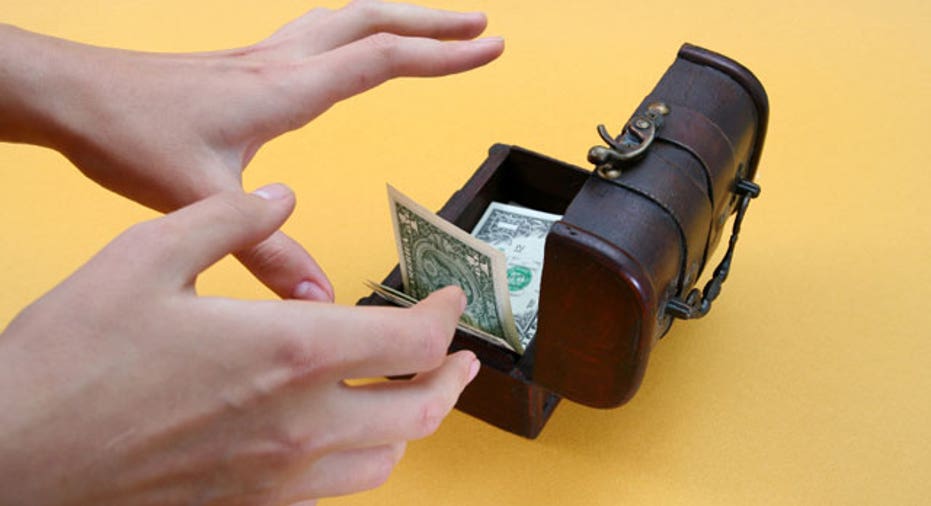Four Ways to Avoid Dipping Into Your Savings Account

Saving money is not easy, but perhaps more difficult is stopping oneself from diving into those savings.
It's a constant battle for consumers to save money. According to the Bureau of Economic Analysis, personal saving as a percentage of disposable personal income dipped year over year in April??from 5.4% in 2011 to 3.4% in 2012.
To become a better saver, Bankrate offers a few suggestions on how to avoid dipping into your hard-earned savings.
Avoid easy access
"I recommend opening a money market account at a bank where you have no other accounts. A small credit union is even better, so you can perhaps earn a better rate," says Kelley Long, a Chicago CPA and personal finance coach.
She also advises savers not to get an ATM card or sign up for Internet account access. Long suggests setting up a savings account so that the only way you will be able to withdraw money is by walking into the credit union or bank and making a withdrawal directly from the teller. This method serves to protect struggling savers from the urges of readily dipping into their savings account by taking away their easy access to cash.
An online savings account also can be your salvation. "Online savings have high interest rates and are out of sight, out of mind. For some, the ability to only do online transfers is a good idea because you are not tempting yourself to spend the money," says Stacy Francis, president of New York-based Francis Financial Inc.
Psychological drivers
There are also psychological drivers that sometimes push people to pull money from their savings. Carrie Rattle is a principal at Behavioral Cents LLC, an organization in New York formed to help women manage their finances in a nontraditional way by looking at how their psyche drives their behaviors.
Dipping into savings is not just a habit, she says. The act is psychologically driven. Often, it will be driven by self-esteem issues or a need for power.
Rattle gives the example of a woman who had a bad day at work and justifies in her mind that she needs a perk. To rebuild her self-esteem, she'll go shopping, buying more than she needs and not even valuing the items.
"I knew one woman who would buy the same item in three colors, then hang them in her closet with the price tags still on. She'd never even wear them," Rattle says.
"To counteract this type of behavior, the spender needs to be aware of her impulse and, instead, go to the gym or meet a friend," she says.
Rattle says that these psychological drivers of money behaviors also apply to men. For example, the need for power can be demonstrated by a man who buys the latest iPhone, high-end watch, luxury car or name-brand suit, regardless of whether he can afford the item.
"I recall one instance when expensive fountain pens became the power symbol of the day in a major bank," she says.
Automate it
Sometimes, the best way to save is simply to automate it, says Orane Williams, founder of Dispelling Realities & Empowering African-American Minds Inc., a nonprofit organization in Union, N.J., that provides financial literacy workshops, college preparatory information and post-college information for urban youth ages 13 to 25.
"The best way to keep out of savings is through automation. Contribute to your retirement accounts before you see your paycheck. I am building my nest egg with ING automatic transfers. Sometimes I don't log in for a while. I always love seeing the balance, and since it takes a few days to complete the transfer, I rarely withdraw from this account," Williams says.
Managing bills and cash flow
Mickey Mikeworth, a financial adviser in Minneapolis and co-founder of Rich Chicks, a group that serves as an independent resource for financial education, says that dipping into your savings account on a regular basis is a warning sign that cash flow may be a problem. According to Mikeworth, consumers need to understand when money is coming in and when bills are due for payment.
"If too many bills are falling on one paycheck, look to see what bills you can change the pay date on," Mikeworth says.
Bills that are automatically paid from your checking account can often be changed, including car insurance, car loans and credit card payments. However, you may have to pay two additional weeks before the biller agrees to change the date, she says.
Cut your spending to help balance your cash flow. Mikeworth says consumers need to trim every possible percentage point of spending they can from their budget. "If you can cut a category of spending by 2%, it is worth doing," she says. "Look at percentages of spending first and not dollar amounts."
If 40% of your monthly cash flow is designated for housing and utility costs, make it your mission to cut 2% out of those costs.
"A small change alone does not change a budget, but 10 (small changes) will make any budget feel like it just had a windfall," Mikeworth says. "You can nickel and dime yourself to wealth just as easily as you can to the poorhouse."
Copyright 2012, Bankrate Inc.



















